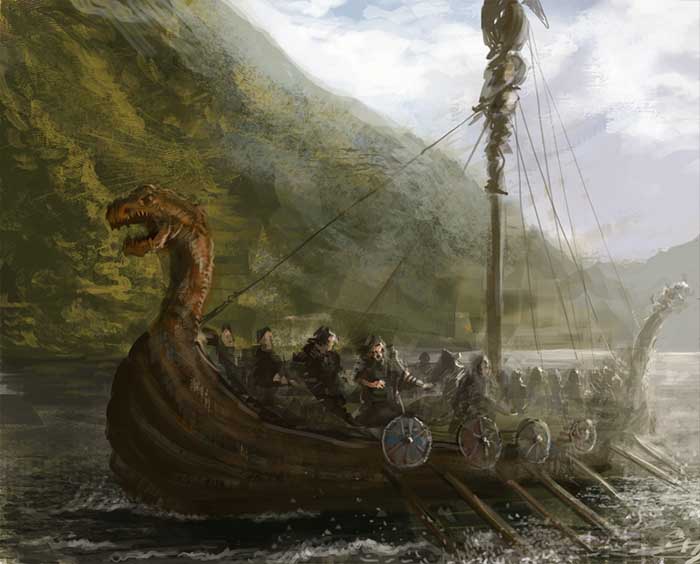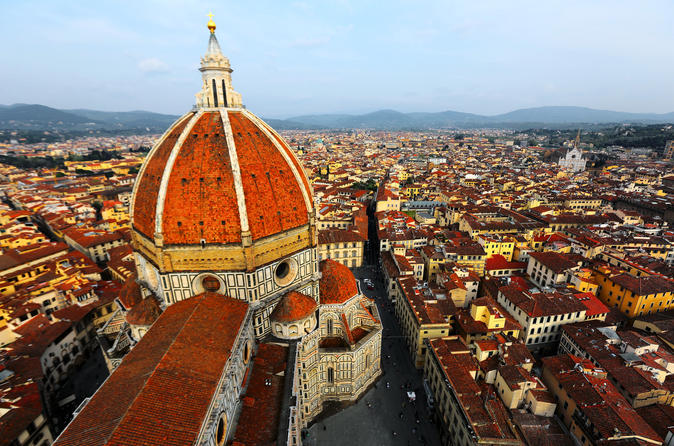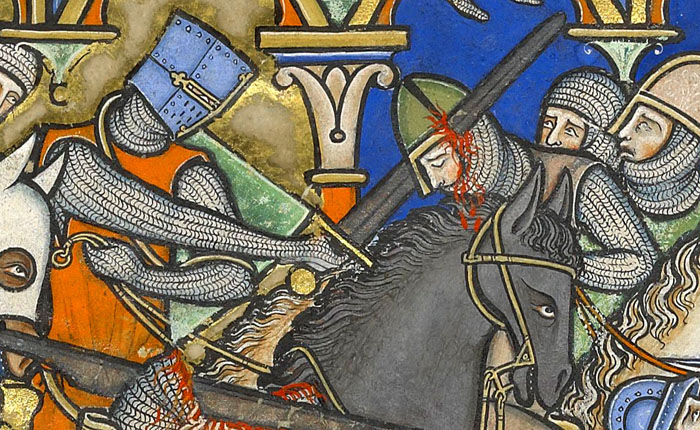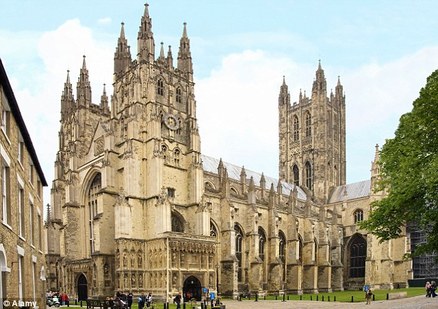In Theory: They Wrote the Songs
While it might seem - and almost certainly is - stuffy and boring to study music theory, a pilot can’t fly without learning the maths and a doctor can’t practice without knowing the biology. In the same way, while a musician, certainly these days, doesn’t need to know music theory in order to play, the early ones did, and the very early ones wrote the rules which everyone would follow in the centuries to come. While there aren’t that many composers I can talk about in this era, there are enough musical theorists to stuff into a phone box and… what do you mean, what’s a phone box? Oh dear, kids today, I don’t know…
 Guido of Arezzo (991/992 - about 1033)
Guido of Arezzo (991/992 - about 1033)
Apparently he’s got a ton of other names, but let’s just go with this one. Guido was an Italian Benedictine monk from Tuscany, who became concerned at the failure of his brothers to remember Gregorian Chant (we’ll be looking at that soon enough, but I’m sure you know what it is - hell, wasn’t it even in the charts at one point?) and came up with a system of notation called The Guidonian Hand. This seemed to involve, um, writing the notes on your hand. Ingenious. I tried to do the same thing for my leaving cert exam but sweated too much and the ink ran. Thanks, Guido! Great idea!
All, it seems, was not roses for our Guido. The monks in his abbey, the monastery at Pomposa, possibly believing his musical notation system sent by the devil (or annoyed because they used their hands for other, um, less godly activities and therefore the ink kept getting smudged) chased him off and he ended up in Arezzo, where he developed the do-re-mi scale still used today, certainly allowing him to claim the title of the father of musical notation, if not the actual inventor of music. Thereafter he became famous throughout Italy, and was even invited by the pope of the time, John XIX, to Rome, an honour he gratefully accepted in 1028. On his return though he was in poor health and though little else is known of him from then, it seems he shuffled off this mortal coil around 1033 and no doubt went to conduct and write notation for the music of the angels. Maybe.
Johannes de Garlandia (1270 - 1320 approx)
Another music theorist who contributed to the science of musical notation, de Garlandia was a Frenchman connected with the influential Notre Dame School of Polyphony, a group of musicians working around the area of Notre Dame Cathedral between 1160 and 1250. He is said to have been a magister, which would have given him the authority to teach at the University of Paris. He published an important treatise on music,
De mensurabili musica, which is seen as one of, if not the most important works in music, as it was the first to propose the theory of rhythm notation.
Franco of Cologne (unknown)
I guess the trouble when you’re dealing with people who lived and died over eight hundred years ago is that the details of their lives are, at best, sketchy, at worst non-existent. There is no record of when Franco was born, or when he died, though it’s generally accepted that he was alive in the mid-13th century. Nobody even knows for sure if he was German, despite the epithet, as he was also known as Franco of Paris, but it seems to be conceded that it’s more likely he was than he wasn’t.
He was part of the Notre Dame School too, and is said to have been quite a powerful figure, papal chaplain and the preceptor of the Knights Hospitalliers of St. John. Another one highly influential in the creation and standardisation of musical notation, he was the first to work out that a note’s length could be written down and determined based on its appearance on the page. His most famous work is
Ars cantus mensurabilis, the first practical, as opposed to theoretical, guide to music aimed at actual musicians.
Petrus de Cruce (unknown)
Another Frenchman, another magister, living around the same time as Franco; it has been theorised that he may have been his student. He too helped the understanding of music through written notation, most importantly the times and durations of notes.

Philippe de Vitry (1291 - 1361)
Also from la belle France, he was widely acknowledged as the greatest musician of his time, revered during the later Renaissance. A devoutly religious man (as you would assume most were back then) he served under Charles IV, Philippe VI and Jean II, as well as serving at Avignon at the court of Clement VI (from 1309-1376, the Pope was sequestered at Avignon in France at the behest of the French king, due to a dispute between the Papacy and the French Crown). However he was also a soldier and a diplomat, neither so incongruous for the time, as popes customarily kept their own standing armies and waged war on anyone who did not obey their edicts, or whose lands they desired.
In 1322 de Vitry wrote a treatise on music called
Ars nova notandi, the name of which has been given to the entire music era of the period, lasting from about 1310-1377. Is it a coincidence that the period known as the Babylonian Captivity, just written about above, seems to parallel this music period almost exactly? I don’t know. I can speculate that with the head of the Catholic Church residing in their home country the French were better disposed and inspired to work on their music for his and God’s glory, but I’d only be guessing. It may be pure chance that the two coincided.
What is generally undisputed is that de Vitry’s work made possible the complex and intricate music that would dominate the next few hundred years, and he wrote chansons (songs) and motets (complex vocal arrangements), unsurprisingly all devotional or liturgical works. At this point in time, it seems the vast majority of music was being sung, and played, in and for churches and cathedrals. One very clear reason for this would be the hold the Church had over its populace and the general belief that music came from, and was a gift from God, and also that the Church as an institution was rich and powerful, and could influence or even patronise kings and queens, to commission only music that was considered acceptable to the Church and to God. This practice would continue for several hundred years; with the exception of love poetry set to music, such as that played by minstrels and troubadours, there really was only one game in town.
Léonin (fl. 1150 - 1201)
The greatest composer of his time, as usual there’s no actual record of his birth, so accounts about him use this abbreviation,
fl., to indicate when he was most active. It stands for flourished in Latin, so he would obviously have been born, we can assume, at least twenty years prior to this
fl. Date, unless he was a child prodigy like Mozart. He was the first known, or at least significant composer of what was known as polyphonic organum. Polyphonic I have already explained; organum was a plainchant for several voices, plainchant being exactly what it sounds like, entirely vocal music with no accompaniment from any instrument. Once again French (or mostly accepted to have been) and again a member, indeed perhaps the founder of the Notre Dame School, he is credited with writing the
Magnus Liber (or Great Book) which was used to help celebrate mass with Gregorian Chant, and set down notation for rhythm and polyphony.
Pérotin
Perontinus Magnus was the one who pioneered the system known as organum triplum and organum quadruplum, which you’ll probably be able to work out, given what I’ve already said, refer to three and four-part polyphony. This was important, as up to now only double polyphony, or organum, had been used, so this was a major step forward for music. This in turn let to the motets spoken of above, and a refinement of his teacher, Léonin’s duplum, or two-part polyphony, which he believed to be too difficult to sing, as with forty notes to a chant, so he shortened them and added extra voices to “take up the slack”, as it were, and also provide harmony to the piece.
Seen as one of the first great composers of western classical music, Pérotin has continued to have an influence, even on modern composers, particularly minimalist ones such as Steve Reich.















 Linear Mode
Linear Mode
